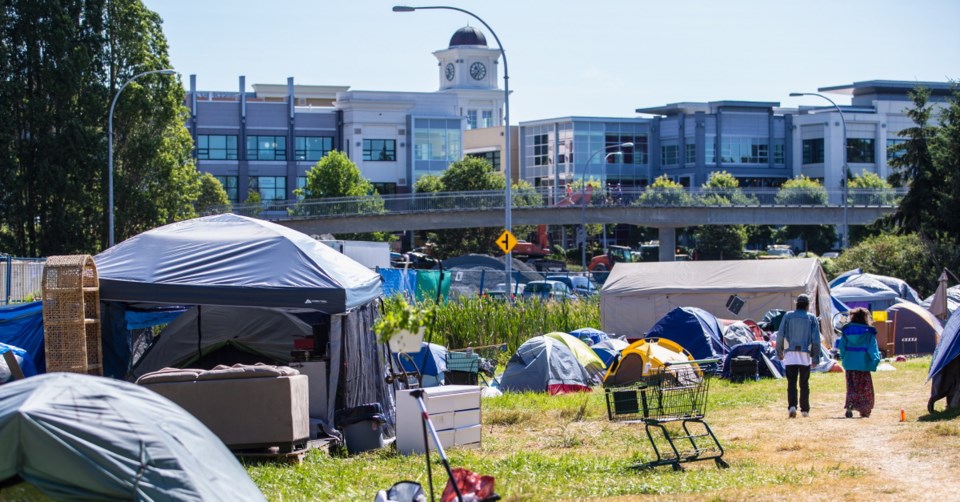Persistent homelessness, visible in the presence of tent cities throughout Canada and particularly in B.C., highlights the failure of society to provide for basic rights that are enshrined in international covenants.
The Universal Declaration of Human Rights and International Covenant on Economic, Social and Cultural Rights set out rights to basic determinants of health.
Specifically, countries recognize “the right of everyone to an adequate standard of living for himself and his family, including adequate food, clothing and housing, and to the continuous improvement of living conditions.” Countries agree to “take appropriate steps to ensure the realization of this right, recognizing to this effect the essential importance of international cooperation based on free consent.”
These are international treaties to which Canada is a signatory. Although not binding, they are powerful statements of the right to the determinants of health. Internationally, Canada has been criticized on several occasions for not meeting these standards.
These failures are repeated by actions of provincial and municipal governments. In fact, systemic actions have contributed to these problems through repeated withdrawal of funding from social housing, reduction of social-welfare payments and ongoing inadequacy of social-assistance payments when compared to costs of living in Canada, including cities such as Victoria and Vancouver. Further, historical and violent policies of colonization have stripped Indigenous peoples of land and resources, with resultant displacement and high rates of homelessness.
An outcome of these failures is keenly felt when neighbourhoods become sites of conflict between housed and unhoused citizens who have little to do with these political decisions. Even worse is that citizens who are homeless become targets for blame, hate and escalating fears with misperceptions about homelessness perpetuated and communicated through media and political decisions.
Daily crimes such as shoplifting and concerns regarding fire safety rarely make the front page of the newspaper except when it involves homeless people, while many other crimes committed go unreported. When people are excluded from and unable to access basic resources for living, they are forced into economies of survival.
So, instead of action and accurate reporting to address these concerns, what we see is further discrimination. The International Covenant on Political and Civil Rights highlights the importance of self-determination and being able to obtain an adequate standard of living without discrimination.
When governments fail to take action to protect basic human rights and provide for basic determinants of health, how is one to survive? Homelessness can be an isolating experience with devastating impacts on mental, physical and emotional well-being.
Tent cities provide a source of community and social connection that are basic determinants of health. The real public-health concern is the lack of basic resources such as water, cooking facilities and storage, which are unavailable to citizens of tent cities.
Rightly and in accordance with the Provincial Public Health Act, the Island Health medical officer of health in Nanaimo required the city to comply with these basic rights and provide water and toilets, as lack of water and sanitation were deemed to present risks to health and well-being.
Such actions are aligned with international covenants to which Canada is a signatory and clearly aligned with public-health evidence about the determinants of health. As citizens, we can deplore the presence of tent cities for these reasons and demand that governments act to ensure basic human rights for all citizens.
Through collaborative efforts of many, the Capital Regional District has been extremely successful in procuring resources to increase the provision of housing in our community with $90 million in investments from municipal, provincial and federal governments to date. The question is: To what extent are these investments benefiting those in need?
Recognizing that some new housing has already come online in our community raises further questions. To what extent have people with experiences of homelessness been involved in the development of this housing? It is not only the creation of housing but the creation of housing that is culturally appropriate and aligned with international rights to self-determination of those who are experiencing homelessness.
Clearly, as citizens we can and should raise these questions to our municipal, provincial and federal governments instead of blaming and targeting tent cities for societal failures. In our research we find that it is residents of tent cities who possess the most in-depth knowledge of the issues related to the social conditions in which they live, and this knowledge is often overlooked or absent in the development of collaborative solutions.
In fact, international guidelines regarding equity and fairness point to working collaboratively with residents of tent cities as key partners in developing solutions.
Bernie Pauly, RN, PhD, is with the University of Victoria School of Nursing and Canadian Institute for Substance Use Research. Katrina Barber, BA, is with the Canadian Institute for Substance Use Research.



